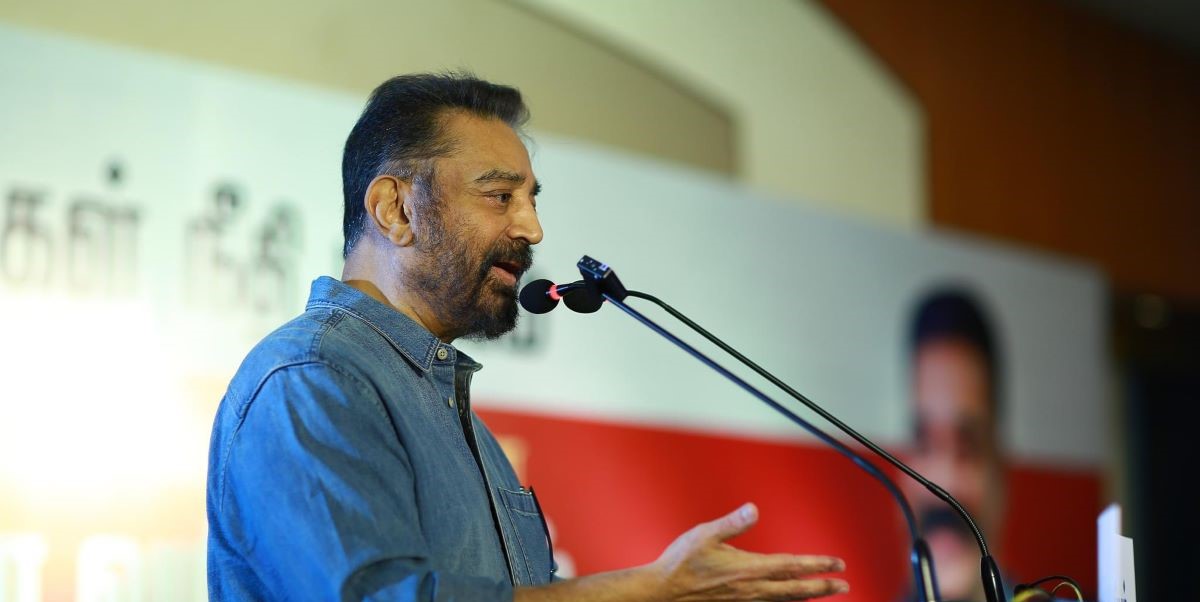Published Jun 17, 2025 | 9:00 AM ⚊ Updated Jun 17, 2025 | 9:00 AM

File photo of Kamal Haasan. (X)
Synopsis: The backlash to Kamal Hasaan’s remarks came from many quarters — Kannada language advocates, liberals, BJP sympathizers, and right-wing cultural activists. But more quietly, another faction was active: those advocating for Sanskrit, and those opposed to Tamil and the broader Dravidian language family.
The film, Thug Life, has finally been released. The controversy between Tamil and Kannada speakers seems to have cooled off — at least for now. But beneath the noise, this episode reveals a deeper and more important lesson.
Before the film’s release in Karnataka, a petition was filed in the Karnataka High Court seeking state protection. Representing Kamal Haasan, his lawyer argued that Kamal wasn’t speaking at a seminar or making an academic presentation. Instead, he was merely trying to engage in a
friendly exchange with a Kannada actor. That gesture, the lawyer said, had been misinterpreted and distorted.
However, the judge was unconvinced. “Regardless of whether it’s Kamal or someone else — how can anyone speak in a way that belittles another language?” he asked. “Is he a researcher? A historian?”
Soon, the conversation moved beyond the courtroom, sparking responses from both Tamil and Kannada historians, further intensifying the debate.
The court repeatedly questioned why Kamal wouldn’t apologize. “Why so much ego? Isn’t it easy to just say, ‘I misunderstood history. I spoke out of ignorance. Please forgive me’? Even Rajaji once made a similar comment and later apologized. If Rajaji could do it, why not Kamal?”
the judge reportedly said — not once, but at least five times during the hearing.
Eventually, Kamal’s legal team responded: “The film isn’t releasing in Karnataka. So there’s no need to apologise. If we’ve made a mistake, we’ll apologise. But how do we apologise for someone else’s misunderstanding?”
This raises a fundamental question: what role should a court play? The judiciary is expected to assess cases based on evidence, testimony, and legal argument — not on personal notions of morality or public emotion. Yet here, even before the defense could present Kamal’s full remarks, the court had already made its opinion known. The idea that an apology could be offered as a precondition, or even a solution, before factual inquiry raises concerns about the court’s neutrality.
The backlash to Kamal’s remarks came from many quarters — Kannada language advocates, liberals, BJP sympathizers, and right-wing cultural activists. But more quietly, another faction was active: those advocating for Sanskrit, and those opposed to Tamil and the broader
Dravidian language family.
It’s crucial to distinguish between the Tamil–Kannada debate and the Sanskrit-versus-regional-languages dynamic.
The Union Government allocates substantial funding to promote Sanskrit. Central schemes often use Sanskrit names. The BJP has long championed Sanskrit. Its ideological parent, the RSS, is committed to constructing a culturally unified India centered on Sanskritized Brahminical heritage. Union Home Minister Amit Shah has even declared Sanskrit to be “the mother of all Indian languages.”
Support for Sanskrit is deeply political. It reflects a vision of cultural supremacy. In contrast, support for Tamil or Kannada arises from the ground — from a fight for linguistic dignity, identity, and federal rights. The difference between these two is as vast as the distance between a mountain and a pit.
When two national linguistic communities — like Tamil and Kannada — come into conflict, the real winner is not either of them. The beneficiary is the central establishment that gains from division.
Neither Tamil nor Kannada language activists have ever jailed those who support other languages. But supporters of Hindi and Sanskrit have historically imprisoned linguistic rights activists.
Kannada has never sought to dominate Tamil, nor has Tamil attempted to dominate Kannada. But Sanskrit — and Hindi, as its modern political vehicle — continues to exert cultural and administrative dominance over both.
An actor speaking casually about the age of a language — without academic backing — may be mistaken, but it’s hardly criminal. But when India’s Home Minister declares Sanskrit superior, the consequences are far more significant — and yet, such remarks receive no similar judicial scrutiny.
This disparity in judicial response becomes even more troubling when we examine other cases. On 16 October last, the same Karnataka High Court bench heard a different case. In September 2023, two men reportedly entered a mosque around 10:50 pm, chanting “Jai Shri Ram” in a threatening manner. A complaint was filed, and both were arrested. The complainant noted that Hindus and Muslims had long coexisted peacefully in the area and that such actions could incite religious tension.
Yet the court dismissed the case, saying: “It’s unclear why this complaint was filed under the section punishing deliberate insult to religious beliefs. How does shouting ‘Jai Shri Ram’ amount to hurting anyone’s religious feelings? Even the complainant describes the area as one of communal harmony. So, this incident is unlikely to have caused any disruption.”
So, chanting a religious slogan inside a mosque is not considered offensive. But a casual, friendly comment about language — taken out of context — becomes a matter of emotional injury?
These two judicial responses reveal a stark contrast in how sensitivity is judged — and whose sentiments are prioritized. Ultimately, the benefits of these divisions do not go to either the Tamil or Kannada people. They accrue to the political and cultural establishment that seeks to centralize and homogenize India through one language, one culture, and one identity.
(Views are personal. Edited by Majnu Babu).

